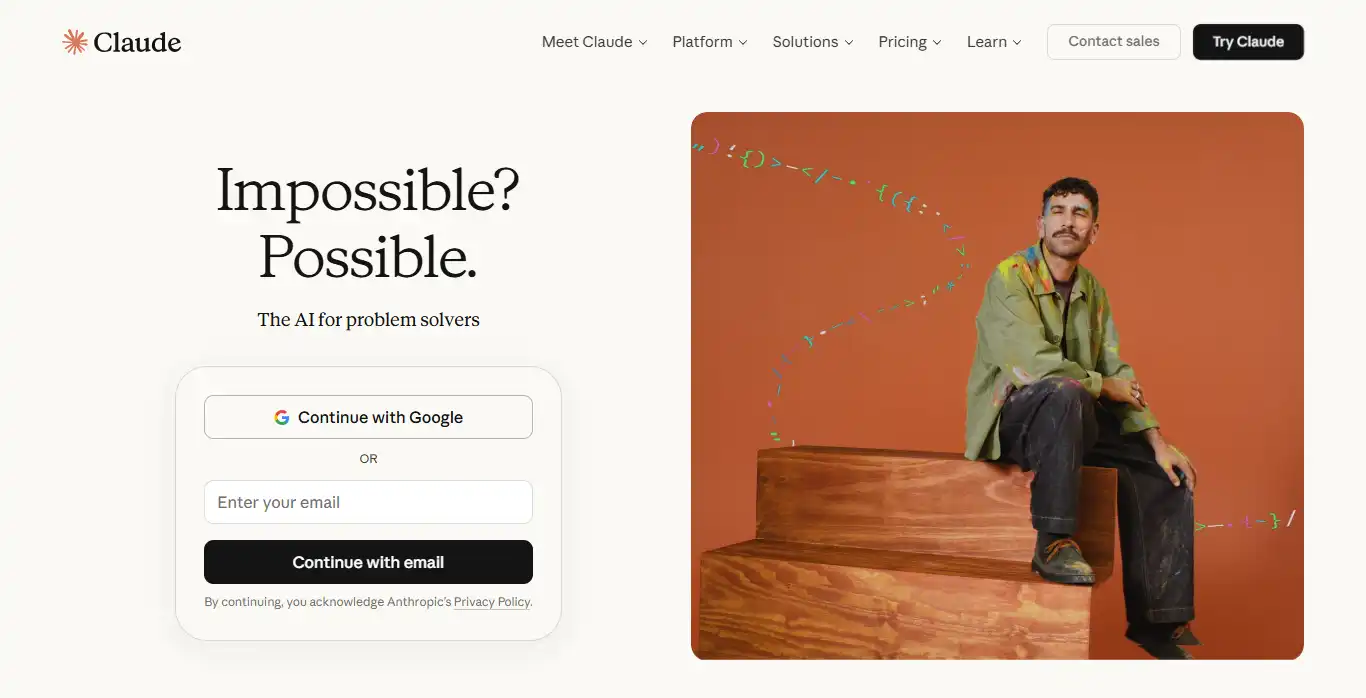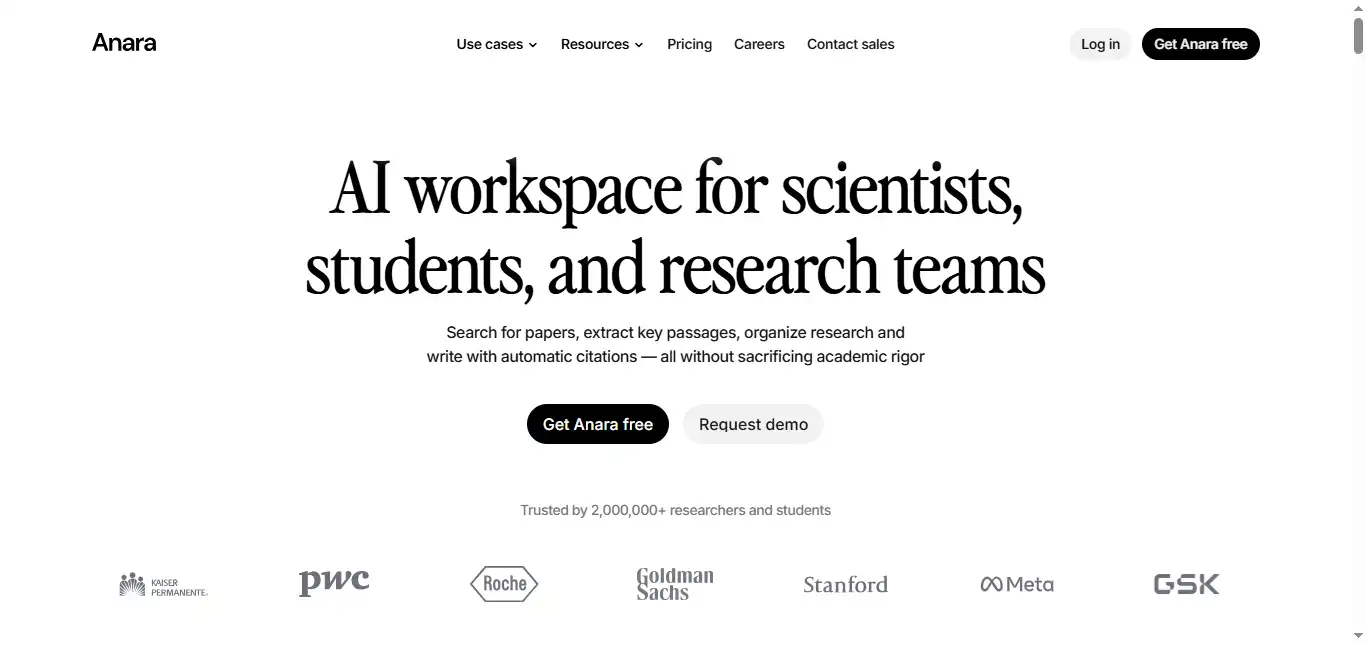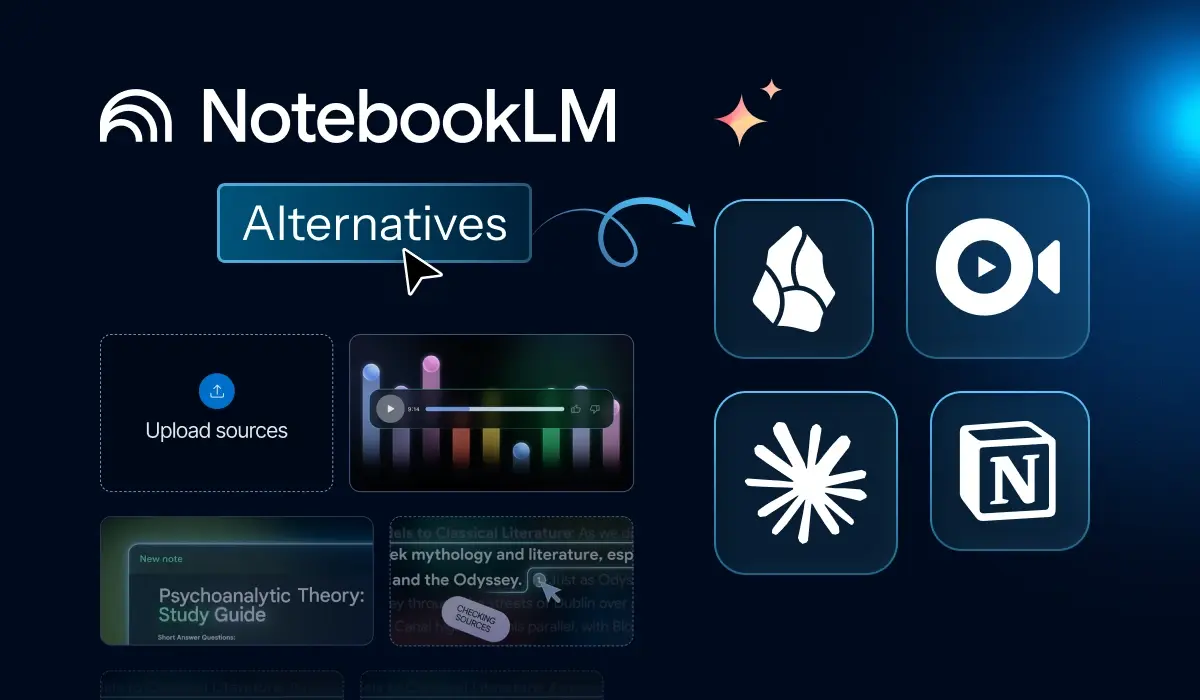NotebookLM has become very popular nowadays for summarizing documents and extracting insights with AI. But, many users find it difficult to use due to its limitations, such as strict upload caps, missed details in large texts, weak citation handling, and privacy concerns since all data is processed in the cloud.
That’s why many are exploring alternative tools that offer greater flexibility, stronger privacy protections, and features tailored to their specific needs.
We have compiled some of the best alternatives for you, each with its own set of features and strengths.
Best NotebookLM Alternatives

TubeOnAI
TubeOnAI is a specialized tool designed for summarizing videos, audios, podcasts, and other multimedia sources instantly. You can upload YouTube links, audio files, or PDFs and get instant transcripts with concise or detailed summaries. TubeOnAI also allows you to set the tone and style of your summaries, whether you want a casual overview or a structured report.
It also allows turn your summaries into an audio just like NotbookLM, but not gonna sound like a podcast.
Otherwise, all features are similar to notebooklm but with better functionality. One thing that will catch your eye is their multi-model switching feature, which you’re not gonna have ever in Google’s product Notebooklm.
A significant advantage is that it allows you to continue asking follow-up questions about the content. It supports multiple languages, features a collection function for organizing summaries, and creates new content from the sources using its repurpose feature.
TubeOnAI is excellent for summarization, transcription, and repurposing the contents, although it doesn’t provide deep academic citations or comprehensive notebook-style knowledge management.

Microsoft 365 Copilot Pages
Microsoft 365 Copilot Pages blends AI with the Microsoft Office ecosystem. Whenever you ask Copilot something, you can save its responses as editable “Pages,” which live inside your workspace. These pages are collaborative, meaning teams can edit, share, and refine them in real-time.
Copilot Pages integrates directly with Word, Excel, PowerPoint, Outlook, and OneDrive, making them ideal for organizations that rely on Microsoft tools. The AI can generate outlines, summaries, or even draft presentations that remain stored until you decide to delete them. It’s powerful for enterprise use, but because it’s tied to Microsoft’s subscription plans, it’s less ideal for individuals who want a free or lightweight research assistant.

Notion
Notion is already famous for its flexible note-taking and project organization, and its AI integration makes it even more powerful. Notion AI can summarize meeting notes, extract key points from long text, and help generate ideas or polished writing directly inside your pages. Combined with Notion’s databases, templates, and linking options, it’s easy to create structured research hubs or reading lists.
Collaboration is seamless — teams can comment, share, and work together on projects with ease. Notion, however, isn’t tailored for strict academic work: it lacks built-in citation tools, and, because it’s chiefly cloud-based, it doesn’t offer the same level of offline control or privacy that some researchers prefer.

Obsidian
For people who value privacy and control, Obsidian is a great option. It stores your notes locally as Markdown files, which means you own your data and can work offline. Its most significant strength is how it lets you link notes together, creating a visual “knowledge graph” of your ideas. With its vast plugin library, you can add features such as PDF import, AI summarization, and integration with citation managers like Zotero.
This makes it flexible enough to mimic NotebookLM’s summarization features while giving you far more ownership of your research vault. The trade-off is setup time: unlike NotebookLM’s plug-and-play style, Obsidian requires customization, and collaboration features aren’t as smooth unless you add third-party syncing.

Claude (Anthropic)
Claude is not a notebook itself but a competent AI model that’s especially good at handling long documents. You can upload large files and have Claude summarize, analyze, or even transform them into new formats, such as spreadsheets, PowerPoint slides, or PDFs.
Recent updates have added tool-use abilities, enabling Claude to integrate with external apps or APIs. It also supports memory and personalization, which means it can “remember” details across conversations. Claude is a strong alternative if you want a conversational research assistant that handles long contexts better than NotebookLM.
However, since it’s a standalone AI, you’ll still need another tool to organize your library of documents.

Anara
Anara is explicitly designed for academic research. It allows you to upload PDFs, audio, or video, and then ask questions that are answered with exact citations from sources such as PubMed, arXiv, or JSTOR. Every response includes traceable references, which makes it ideal for literature reviews and academic writing.
Anara also features tools for creating flashcards, quizzes, and searchable libraries, making it a practical study aid as well. Compared to NotebookLM, it’s far stronger for citation management and structured research, but it’s also more specialized and may feel unnecessary for casual note-taking or general productivity.

Scholarcy
Scholarcy focuses on speeding up the way you read academic papers. It can transform a research article into a structured summary that highlights methods, results, limitations, and references. These summaries are interactive “flashcards” that you can skim, and they integrate with tools like Zotero for citation management.
Scholarcy can export summaries into Excel, Markdown, or other formats, which helps compare multiple studies side by side. It also offers a browser extension that summarizes papers in real-time. While it’s excellent for quickly screening large numbers of papers, it’s not designed for deeper synthesis or collaborative writing.

Paperguide
Paperguide aims to be an all-in-one AI research assistant. It features a powerful search engine that covers more than 200 million papers that enabling you to ask research questions and receive answers with proper citations.
You can also upload PDFs, chat with them, and extract important information. Paperguide supports citation imports and exports in formats such as BibTeX and Zotero, and it allows you to organize references into tags and folders.
Additionally, it provides literature review tools, AI-assisted writing, and metrics to evaluate the quality of papers. Its collaboration and multi-language features make it attractive for group projects. The main limitation is that, while it covers a lot of ground, its summaries may lack nuance for very advanced academic work, so human verification is still necessary.
Conclusion
Each of these tools fills a gap that NotebookLM leaves open. TubeOnAI is ideal if you work with a lot of video or audio content. Microsoft 365 Copilot Pages works best inside business teams. Notion is a flexible organizer, while Obsidian gives you privacy and customization.
Claude is an excellent AI brain for handling very long texts. For academic-focused research, Anara, Scholarcy, and Paperguide provide stronger citation tools and structured summaries. Instead of relying solely on NotebookLM, you can choose one (or a combination) that best matches your workflow.
FAQs
Why should I look for alternatives to NotebookLM?
NotebookLM is useful but limited as it struggles with large uploads, doesn’t handle video or audio well, and has privacy concerns since files are cloud-processed. Alternatives can offer better features, such as citations, local storage, or multimedia support.
Which tool is best for summarizing videos and podcasts?
TubeOnAI is the strongest option here. It can summarize YouTube videos, podcasts, and audio files, while also letting you organize summaries into collections and continue conversations with its “Magic Chat” feature.
What if I primarily work with Microsoft Office tools, such as Word and Excel?
Microsoft 365 Copilot Pages is ideal. It integrates directly with Word, Excel, PowerPoint, and OneDrive, letting you save AI responses as editable, shareable “Pages” that teams can collaborate on.
I need an all-in-one organizer, not just a summarizer. Which tool fits best?
Notion works great for a flexible organization. You can combine AI-powered summaries with task lists, templates, and databases — all inside a single workspace.
Are there privacy-friendly alternatives to NotebookLM?
Yes. Obsidian is the top choice for privacy. It stores notes locally on your computer as Markdown files, so you fully own your data. With plugins, you can also add AI summarization and citation tools.
Which tool handles very long documents the best?
Claude (Anthropic) is excellent for analyzing long documents, producing summaries, or transforming them into new formats like slides or tables. It can handle more context than most alternatives.
What’s the best alternative for academic research?
Anara is built for academics. It provides citation-backed answers from sources such as PubMed and JSTOR, along with flashcards and study aids. Scholarcy and Paperguide are also strong. Scholarcy provides structured summaries of papers, while Paperguide features a built-in search engine for over 200 million papers and offers citation management tools.
Can these tools help me with citations and literature reviews?
Yes. Anara, Scholarcy, and Paperguide are especially good at this. They not only summarize papers but also provide exportable citations in BibTeX, Zotero, and other formats, making literature reviews easier.
Do any of these tools work offline?
Obsidian is the main offline option, since it stores everything locally. Others, such as Notion, TubeOnAI, and Paperguide, are cloud-based.

